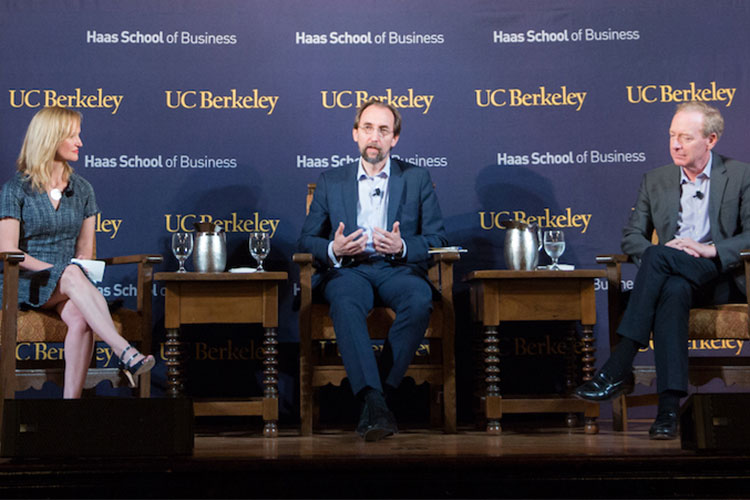Technology’s role in protecting free speech
With freedom of expression being challenged around the world — and in clashes on the UC Berkeley campus — is there more that the technology industry can do to protect free speech and other human rights? The answer was a resounding “yes,” as the United Nation’s High Commissioner for Human Rights, Zeid Ra’ad Al Hussein, and Microsoft President Brad Smith spoke Thursday at Berkeley-Haas.

October 2, 2017
With freedom of expression being challenged around the world — and in clashes on the UC Berkeley campus — is there more that the technology industry can do to protect free speech and other human rights?
The answer to that question was a resounding “yes,” as the United Nation’s High Commissioner for Human Rights, Zeid Ra’ad Al Hussein, and Microsoft President Brad Smith spoke Thursday at Berkeley-Haas.
The panelists agreed that technology allows for better tracking of abuses around the world, while also enabling better communication with political dissenters—and that technology companies themselves have an important role to play, Bill Snyder writes in an article on the Berkeley-Haas website.
Haas Dean Rich Lyons framed the discussion by noting that some 75 percent of governments around the world restrict freedom of expression, according to Amnesty International.
“You may be tempted to think this is a ‘them-not-us’ situation, but the U.S. ranks number 43 on the World Press Freedom Index, ranking just below the West African country Burkina Faso,” he said.
Although Americans overwhelmingly support the right to free speech, that doesn’t translate into support for hate speech, he said. “Recent events at Charlottesville have brought hate speech to the forefront of our nation’s conscience and reignited calls for censorship.”
Balancing conflicting priorities is the challenge, said Hussein.
Smith reiterated Microsoft’s pledge to help the Human Rights Commission strengthen its work by embarking on a five-year, $5 million partnership. Hussein said Microsoft’s technology has improved the commission’s ability to communicate with dissenters it could not normally reach, and to sift through data on alleged ethnic cleansing in Myanmar.